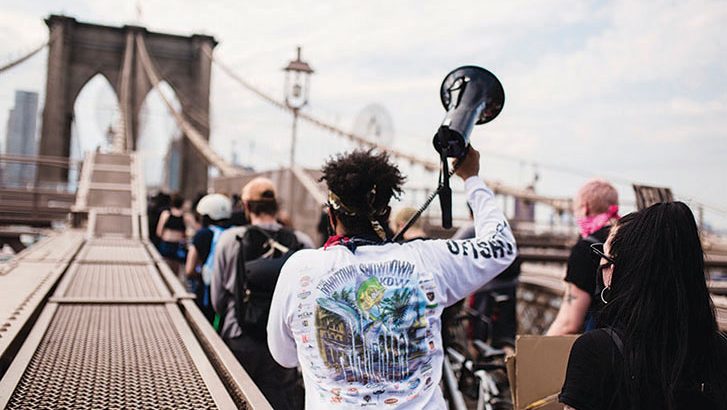“You don’t get to be Racist and Irish,” Imelda May reminded us in her powerful poem recently. I would be inclined to add that you don’t get to be racist and Christian either but that isn’t always clear. Whether it is Donald Trump wielding a Bible in front of St John’s Episcopal Church or a statement from the Church Militant group referring in derogatory terms to Archbishop Wilton Gregory as an ‘African Queen’ because he challenged Trump’s recent visit to the Saint Pope John Paul II shrine in Washington, Christianity has been dragged by its shirt collar into the explosive tensions created by racism.
Many of the far right nationalist groups in America see themselves as ‘good Christian folk’. They use racist and anti-Semitic language to defend their actions and protect what they see as their ‘God-given right’ to their perceived superiority. Even within Catholicism there are echoes of this twisting of the Gospel and indeed within our own country there are those who make claims to Catholic identity, using provocative language, incitement of fear and claims of patriotism to promote a clearly racist agenda.
Events of recent weeks have provoked robust and challenging conversations in our house. We have talked about anger – not as something to be supressed but as a force for transformation. But then we have also talked about the problem of violence and how Martin Luther King, rooted in faith and a vision of the Kingdom of God could rely on love and peaceful protest to effect change.
The question has been raised: How does faith contribute in any positive way to resolving the conflicts brought about by racism?
For me, it has been vital to be able to direct our adult children’s attention to powerful Christian witness which names the sin of racism and demands change. One such witness was Martin Gugino, a 75-year-old man who is a long-time volunteer with the Catholic Worker Movement. He has spent his adult life working for peace and justice and it was in this context that he was present at the Black Lives Matter protest in Buffalo where he was knocked to the ground by police, suffering a serious head injury. Gugino and the Catholic Worker Movement take the Beatitudes seriously – blessed are the peacemakers, blessed are those who hunger and thirst for what is right. And I need to be able to say to my children: “This is what it means to be a Christian, this is where we need to be.”
If we had any illusions that all those racist issues were only a problem in America we should surely have been well and truly shaken out of such complacency. There have been many interviews on radio and television where people of colour, both Irish and immigrant, have spoken of the racist abuse they have received here, in Ireland, at school, in GAA clubs, on the streets and elsewhere.
We may see ourselves as innocent of such acts but racism and discrimination thrive in the structures and habits of our society so we need to look deeper. What attitudes have we inherited – and indeed passed on? What is reflected in our humour? How do we engage with those whom we see as being very different to ourselves? How often have we labelled people and dismissed them – ‘ah sure that lot are all the same’? Within our own country how have we treated members of the Travelling Community or the Muslim family that moves in next door? What would people of colour within our own Catholic parishes tell us about their experience? Are we open to such conversations? Do such questions make our hackles rise? Do we become defensive?
Have we the courage of Martin Gugino? Do we take our Christian faith and indeed the Beatitudes seriously? Being outraged at racism and discrimination is appropriate but outrage needs to move to action where we speak out and challenge ourselves, those around us and our society.


 Bairbre Cahill
Bairbre Cahill
